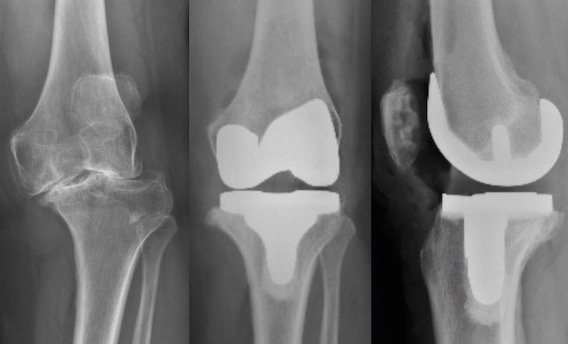
Complex Knee Replacement
Complex knee replacements are those that are required for conditions that make a standard knee replacement surgery inadequate. Some of the most common challenges include:
Severe Bone Loss: This includes prior surgeries, fractures, or wear and tear effects from failed implants that have caused significant bone loss. This will make securing a new implant much more challenging.
Significant Deformities: Severe varus or valgus deformities, such as bow-legged or knock-kneed conditions include particular techniques in the realignment of the leg.
Revision Surgery: Those cases in which a knee replacement has previously failed due to infection, loosening, or wear.
In some individuals, the ligaments are torn or too weak to support the knee either during or following surgery.
Multiple Joint Involvement: In conditions such as rheumatoid arthritis and other systemic diseases, several joints may be affected and may need a more generalized surgical approach.
What are the Benefits for the Patients?
Improved alignment: The robotic assistance allows for perfect alignment of the implant to the natural configuration of the patient, thereby reducing the risk of loosening or failure of the implant.
Less invasive: Smaller cuts usually mean less bone and tissue is taken out, leading to smaller incisions and less postoperative pain.
Customization: The robot will enable intra operative adjustments for real-time data to ensure that a personalized approach is maintained in every individual.
PSI: Patient-specific instrumentation, PSI, is a technology wherein customized surgical instruments are designed and built to match the specific knee anatomy of the patient. Preoperative 3D imaging allows the designing of such instruments for more accurate bone cuts and positioning of implants. In complicated deformity or cases where previous failed surgeries have been performed.
More accuracy: The custom tools fit the unique anatomy of the patient, reducing the chance of surgical errors.
Less removal of bone: The precise cuts cause limited damage to the healthy bone by preserving as much of the knee’s natural structure as possible.

Speedier surgery: Since tools are custom-designed for the patient’s knee, the surgery can be speedier.
Structural support provided: These devices work like scaffolding to provide support to the new implant in areas where bone is absent.
Bone ingrowth encouraged: Certain materials help natural bone growth around the implant, which assists in yielding better long-term results.
Increased life of implant: When defects in bones are filled, augments reduce extra stress on the rest of the bone and help avoid further complications.
Reduced risk of osteolysis: Wear particle production being reduced by HXLPE, thereby reduces the risk of bone loss, which is very common in osteolysis and one of the key reasons behind implant failure.
Durability: implants made of HXLPE are designed to last long for even highly demanding patients.
Want to know more about Knee Replacement Surgery?
Why Choose Us?
Years Experience
Happy Patients Globally
Surgeries
Schedule an appointment!
Get expert advice!

Frequently Asked Questions
Complex Knee Replacement
A standard knee replacement typically addresses wear and tear in the joint due to osteoarthritis. A complex knee replacement, however, is required when there are more severe conditions, such as significant deformities, previous surgeries, bone loss, or ligament damage, which make the procedure more challenging.
Patients with severe knee deformities, infections, multiple failed knee replacements, extensive bone damage, or those with conditions like rheumatoid arthritis or trauma, may require a complex knee replacement.
While risks are similar to standard knee replacements, they may be higher due to the complexity of the surgery. Potential risks include infection, blood clots, prosthetic loosening, nerve or vascular injury, and a longer recovery period.
Recovery after complex knee replacement may take longer than standard knee replacement. Full recovery can range from 6 months to a year, depending on the patient’s condition, rehabilitation, and overall health.
Most patients experience significant pain relief and improved mobility after surgery. However, due to the complexity of the procedure, the outcomes may vary, and the rehabilitation process might be more intensive.
